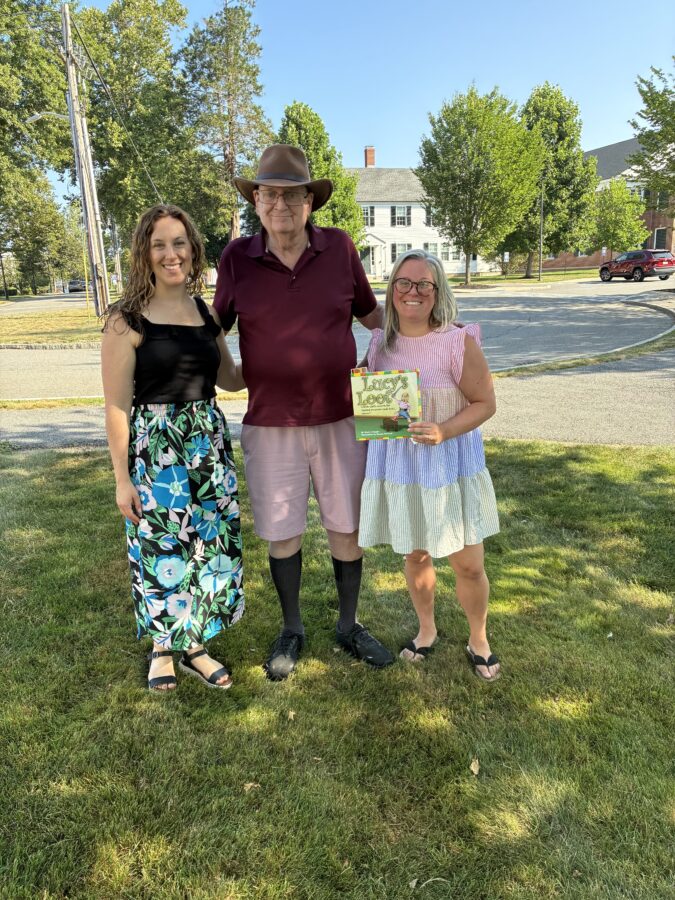
Staffers from Lawrence Academy at Groton (MA) welcome Mark during an August campus visit. From left: Sarah Chadwick, Mark, class of ‘63, and Leigh Korpal, holding “Lucy’s Loot,” Mark’s latest children’s picture book.
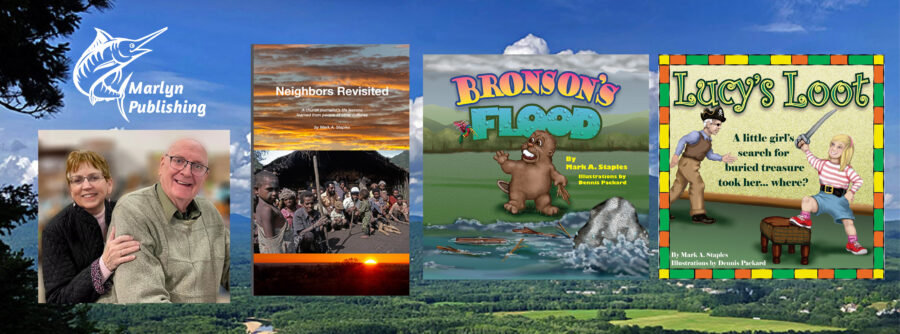
Lucy’s Loot: Pop Pop always had a surprise or two whenever 8-year-old granddaughter Lucy came to visit. One day he suggested a hunt for “buried” treasure. Lucy’s imagination ran wild! Would there be: Pirates? Parrots? Gold doubloons (coins)? Read to learn about what happens next!
Learn more about Lucy’s Loot
Purchase Lucy’s Loot on Amazon
Bronson’s Flood: The story of how a talented beaver worked with his neighbors in the woods to save his village from a flash flood. This children’s picture book is designed to give children a preliminary glimpse of how storm survivors, long-term recovery professionals and volunteers may work together to overcome disastrous calamities. It also teaches young readers about the importance of discovering and making best use of one’s gifts.
Learn more about Bronson’s Flood
Purchase Bronson’s Flood on Amazon
Neighbors Revisited: A church journalist’s life lessons learned from people of other cultures describes life lessons the suthor learned from people of other cultures during travels to six countries in Africa and Asia from 1981 to 1985. The six nations visited in Africa are South Africa (including visiting Soweto illegally during apartheid), Namibia, and Zimbabwe immediately after independence, and in Asia the Philippines, Papua New Guinea (10 years after attaining independence) and Northern Sumatra in Indonesia where the author celebrated Easter in ways he could not have imagined. The life lessons learned happened in places readers in the United States may not have visited.
Learn more about Neighbors Revisited
Purchase Neighbors Revisited on Amazon
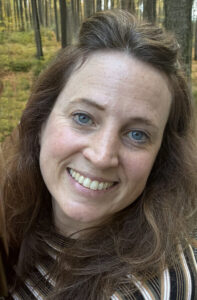 Mark and Lynn’s daughter, Beth, helped to launch Mark’s late life book publishing vocation by suggesting the idea for the Neighbors Revisited memoir. She had read the author’s autobiography written for family and liked the segment on his photojournalistic overseas assignments. Beth, a tenured professor at Washington & Lee University, teaches creative writing and publishing at the school. She is also the first woman to manage The Shenandoah, the university’s literary journal.
Mark and Lynn’s daughter, Beth, helped to launch Mark’s late life book publishing vocation by suggesting the idea for the Neighbors Revisited memoir. She had read the author’s autobiography written for family and liked the segment on his photojournalistic overseas assignments. Beth, a tenured professor at Washington & Lee University, teaches creative writing and publishing at the school. She is also the first woman to manage The Shenandoah, the university’s literary journal.
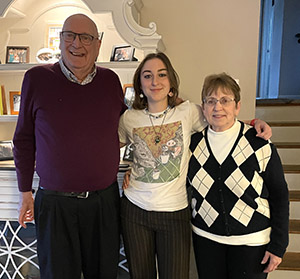
Mark, Lucy (now a young adult) and Lynn
A children’s picture book about a grandfather’s and granddaughter’s discovery of “buried treasure.” Guess where? Learn more…
The cast – which includes long-term disaster recovery staff and volunteers – who bring Bronson’s Flood to life with audio:
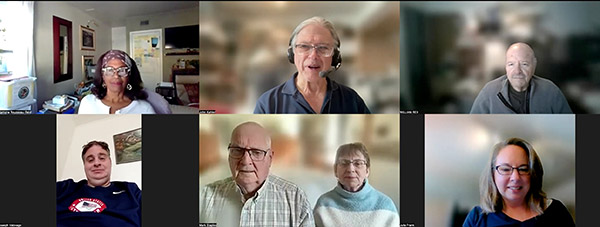
from top left: Ramona Rousseau-Reid as Martha, producer John Kahler, the Rev. Bill Rex as Garth, Joe Valovage as Bronson, author Mark Staples narrates, Lynn Staples as Dori, and Julia Frank as Hannah
Mark A. Staples has been an author, writer and editor for more than 50 years. As a Christian photojournalist he has traveled on assignment to 13 countries and 30 states. His life experience includes having served as a long-term flood recovery volunteer and as a shipboard visitor for 10 years in the Port of Philadelphia, certified by the federal Department of Homeland Security.
His first book, Neighbors Revisited, conveys life lessons learned from people of other cultures in six African and Asian places. In this book, the author especially wanted to share the importance of valuing folks from backgrounds different from his in a polarizing time.
Mark’s also the author of two children’s picture books. Bronson’s Flood, illustrated by Dennis Packard, teaches young readers the importance of discovering their special gifts. It also provides an early glimpse of how disaster professionals, volunteers and survivors may work together to overcome calamities. Lucy’s Loot, also illustrated by Dennis Packard, is a whimsical tale of how the author and his eight year old granddaughter searched for “buried” treasure. Guess where?
Mark lives in King of Prussia, PA, with his spouse, Lynn of 58 years. The couple has three adult daughters and four grandchildren. Mark and Lynn are members of Trinity Lutheran Church in Lansdale, PA.
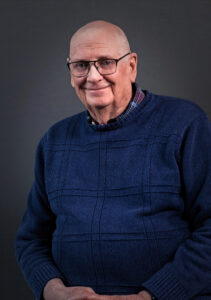

Staffers from Lawrence Academy at Groton (MA) welcome Mark during an August campus visit. From left: Sarah Chadwick, Mark, class of ‘63, and Leigh Korpal, holding “Lucy’s Loot,” Mark’s latest children’s picture book.

A once-missing earring can be “buried” treasure.
The tale behind this latest picture book is based on fact.
Our granddaughter, Lucy McGettigan, 8-years-old at the time of the story, often visited us on weekends.
The memories of those times remain alive and precious to me.
In the case of the story in this book, I had in mind a chore that needed to be accomplished – vacuuming the living room, including tipping the sofa back to clean beneath the furniture. It hadn’t been done for months.
Because of the way the furniture worked, a recliner at each end with spaces open to the floor next to each side of the middle seat cushion, I had a hunch there might be “stuff” on the floor that had fallen over time from the pockets of folks who sat there. But I really didn’t know what.
As I prepared breakfast, I concocted a scheme. Might we turn a household chore into a search for unknown “buried” treasure? An adventure?
As the picture book notes, I ran the idea by Lucy. She imagined a typically exotic activity at first.
When I pointed out the actual nature of the chore/adventure to Lucy she was skeptical and disappointed at first, but she trusted me. In the book, she then used her imagination to embellish the chore into an adventure featuring costumes. This part of the book is beyond what really happened that day and was the suggestion of my children’s book editor, Kellie Hultgren of Minneapolis. But the costume idea would not have been unusual for the imaginative granddaughter that I love. What is fact is that Lucy did latch onto the idea originally because of many good experiences we had shared before.
No one was more surprised than me that “treasure” was indeed to be found on the dust-mite-filled hardwood floor beneath the sofa. Of course, a few of the items were old and unsavory. But some of the findings had value.
Is there significance to a story like this beyond its serving as simply a fun-filled memory? The largely spontaneous activity featured unanticipated surprise. It became something of an educational exchange opportunity for us both at the time too. Namely, it is possible to find “buried” treasure close to home in an unusual, sometimes forgotten place. Have you ever found an earring that’s been missing when you went to vacuum the floor a day or two later? Have you ever known the joy that comes with such a discovery?
We’re turning Lucy’s Loot into an audiobook with our voices to provide memories for family members who come after us.
Lucy and her grandparents have shared many memories over the years. She is now 20 and an amazing young woman.
If you recall an episode like this with a loved one such as a grandchild or child, please leave a comment here. In a few sentences. Maybe the memory might become a book for you!
 Most of you know about my background in photojournalism explained elsewhere on this site.
Most of you know about my background in photojournalism explained elsewhere on this site.
I remain a news junkie, but when the daily reports about divisiveness, featuring strident criticisms of diversity equity and inclusion (DEI) abound too disagreeably for me, I turn to music. These days that happens often.
I tried to celebrate those DEI qualities in my book Neighbors Revisited anyway. The book, which you can obtain through this website, is the best way I’ve had as a writer to disparage critics of DEI and celebrate the values of people who don’t look like me and what they have to offer to our world. Without those folks I’ve met along the way in my reporting and photography, the world would be a much lesser place. Back to music. I enjoy jazz and classical music. Sometimes I find humor in it. An imaginative jazz pianist and lyricist, Mose Allison, once wrote a song with the title, “I don’t worry about anything, because I know nothing is going to be alright.” The song gives me a laugh, gallows-like.
Mostly I watch a lot of classical performances on YouTube. A favorite symphony of mine is Number One by Johannes Brahms. A favorite version involves the Radio Orchestra of Frankfurt under the direction of Andres Orozco Estrada, a native of Medellin, Colombia, and now a celebrated violinist and musical director with energy and spirit that abounds.
Many aspects of this symphony performed so inspirationally move me deeply. First, and those of you familiar with it already know about this, there is the moment in the fourth movement when, musically, the clouds part and the sun peeks through in the form of a French horn solo and the flute and other instruments that unforgettably follow. I know when that groundbreaking solo is coming, but, still, it gets me every time, and I weep through it. It tells me musically that truly everything is going to be OK (unlike the Mose Allison lyric the jazz pianist does so tongue in cheek). And I take deep heart in the gift of that sound so eloquent. It speaks profoundly to the deepest part of my God-given soul.
Then there are the performers themselves. I’ve heard and seen them now in many performances, one being Igor Stravinsky’s “The Rite of Spring.” It is an inclusive group featuring in one performance a Black flautist, Filipino and other Asian violinists. They are so beautifully rehearsed, all pulling and working together the same way to give voice to a supremely gifted German composer. It is the essence of what I tried to capture in Neighbors Revisited, that when we celebrate each other despite our differences and blend our talents and ideas the world becomes a better place, sometimes only for a moment.
Toward the end of the Brahms Symphony the camera captures a fleeting glance and smile from the renowned Spanish-born flautist Clara Andrada toward the gifted Black flautist beside her, London, England-born Matthew J. Higham. The moment briefly acknowledges the musical journey they have shared. Wonderful.
Praise be to God for the gift of experiences like this. Music to my ears and beyond.